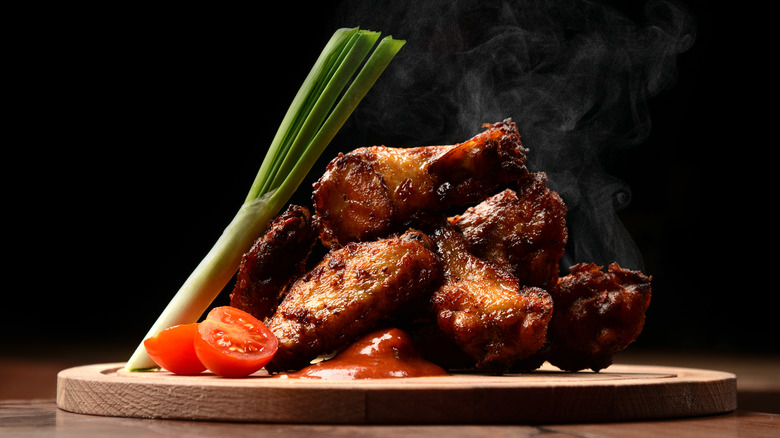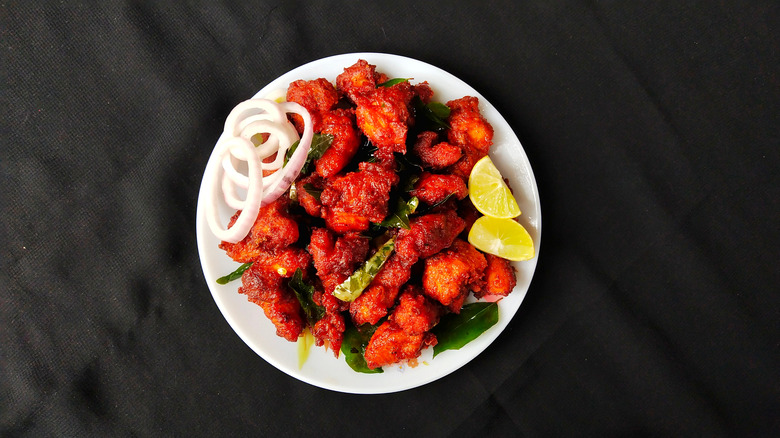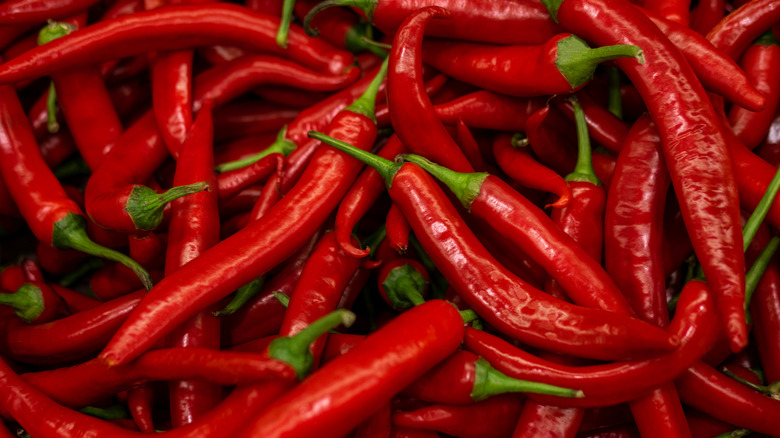Surprising Side Effects Of Eating Too Much Spicy Food
If you're one of the many Americans who love to douse their food with hot sauce, you may want to read this. Whether you enjoy pushing your tastebuds to the limit for an added thrill, challenge, or just because you love the taste, there are some unexpected side effects of spicy food you should be aware of.
Arguably one of the most common spicy food side effects has to do with how your body actually processes the food. Stomach acidity can be triggered by spicy foods containing capsaicin, which also slows down your digestion rate and increases your risk of heartburn developing (via Insider). Heartburn or acid reflux occurs when this stomach acid goes back up into your esophagus, causing a burning sensation in your chest. Additionally, as acid moves up your esophagus, you may notice your breath smells different — and not in a good way. Beyond leaving you with smelly breath, spicy foods may also cause throat irritation that leads to inflamed vocal cords and a hoarse voice (via Eat This, Not That!).
If that weren't enough to deter you, there are more ways spicy foods can affect your stomach. Unfortunately for some, eating spicy foods has a laxative effect that may have them running to the nearest restroom, according to Eat This, Not That!. Other common tummy troubles include acute gastritis, accompanied by unpleasant symptoms like nausea, vomiting, and feelings of fullness in your upper abdomen. While these symptoms often come on quickly, they generally don't last long.
Other reasons you may want to limit spicy food in your diet
Spicy foods not only bring the heat internally, but externally as well. Some spicy foods can feel hot on the skin, and in extreme cases, can leave blisters and rashes after you touch them. Dr. Barry Green of the John B. Pierce Laboratory explains that spicy foods actually trigger skin receptors that react to heat. As a result, our central nervous system responds to the pain fibers that are stimulated by the chemicals in hot peppers through physical responses such as sweating and feeling flush (via Scientific American). And that's not the only effect it has on our skin. Interestingly, the sweating response can actually exacerbate existing skin conditions like eczema or acne breakouts, according to Insider.
Interestingly, spicy food may also prevent you from snoozing. Studies have shown eating spicy food at night can make it harder to get a restful night of sleep. A study published in the International Journal of Psychophysiology found that eating Tabasco sauce with a meal late in the day resulted in sleep loss for several healthy young men. The study authors inferred that this was because eating spicy food can raise the body's temperature and make it more difficult to relax in the evening. This theory has been supported by other studies including a review from 2008 that looked at the relationship between insomnia and body temperature.
Are there benefits to spicy food?
So now we know several reasons to ditch an extra douse of hot sauce. But before you nix spicy foods for good, there are some positive benefits to eating them as well. For starters, let's zero in the capsaicin element of spicy foods. This chili pepper component can actually act as a metabolism-booster, allowing your body to burn more calories and promote weight loss (via Penn Medicine). Additional health benefits of red chili peppers in particular are lower levels of low-density lipoprotein, or "bad" cholesterol.
All in all, spicy food is a personal preference and can be fine for most people in moderation — so long as you're still making healthy food choices with your spice. If you are experiencing any of these side effects while enjoying spicy food, it may be wise to consult with your healthcare provider on any possible long-term effects — or just take a breather from the hot sauce while your body recovers.
How to find relief after eating spicy food
It's easy to go overboard with spicy food and a subtle hot kick can quickly turn into a painful experience in the mouth. If you find yourself in pain after indulging in a spicy meal, don't guzzle a glass of water. According to Delish, this may make the fiery flavor in your mouth burn even more. Instead, stir some sugar into your water before drinking. Sugar helps absorb capsaicin, the oil-based chemical compound that gives spicy food its heat. Sugar or honey will tone down the heat level and subtly change the flavor in your mouth.
Milk is another go-to remedy for many people experiencing a burning tongue (via Eating Well). A protein present in most dairy products called casein helps to break up the capsaicin in spicy foods. Because casein is non-polar, it will then bind with the capsaicin and prevent some of it from reaching the mouth's pain receptors. This will offer some relief from its uncomfortable effects. Cold dairy products, like milk and yogurt, can also feel soothing inside a burning mouth.




